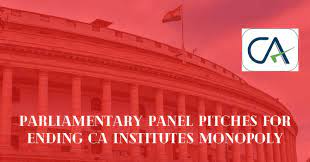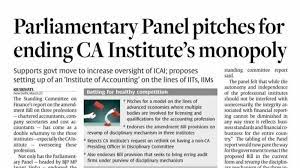ICAI’s statutory monopoly is proposed ending by Govt Panel
Table of Contents
ICAI’s statutory monopoly is proposed to be going end by a parliamentary Panel
- The report of the Standing Committee on Finance on the bill revising three professions—company secretaries, chartered accountants and cost accountants—has been a blow for all three institutions, particularly the CA Institute, which regulates these professions.
- Parliamentary Panel, which is led by BJP MP Jayant Sinha, has recommended going to end the “statutory monopoly” that the CA Institute currently holds over the accounting profession in addition to supporting the proposed revision of the disciplinary mechanism (which contains appointing a non-member as the presiding officer of the Disciplinary Committee).
Competition blues
- The Panel has recommended that the government should take into consideration generating Institutes of Accounting (IIA) comparable to IITs and IIMs for the further development of the accounting and finance profession in the country, stating that multiple bodies similar to those that developed economies are required to promote healthy competition.
- In its report on the The Chartered Accountants, The Cost and Works Accountants, and The Company Secretaries (amendment) Bill 2021, which was introduced in Lok Sabha on Wednesday, the Parliamentary Panel noted that, in contrast to India, where one institute has a “statutory monopoly” over the “whole profession,” the qualification and licencing of accountants is handled by a number of bodies in developed nations like the US, UK, and Canada.
- The research has underlined that when one institute has a legal monopoly over the profession, the potential for improving the quality and competency of the profession is still constrained.
- During its deliberations, the Parliamentary Panel came to the conclusion that numerous bodies, similar to those in developed nations, are necessary to encourage healthy competition, raise the bar for auditing standards and quality, and enhance the credibility of financial reporting.
Disciplinary Committee
ICAI Institute requested a re – examination of the provision pertaining to the composition of the disciplinary committee and the Board of Discipline in light of the Bill that was introduced in Lok Sabha in December of last year and that proposes a major overhaul of the Board of Discipline and Disciplinary Committee in these institutes.
“The Committee is inclined to support the proposed amendments without modification, even though they do not significantly decrease the professional autonomy of the 3 institutes, in our opinion. The standing committee report stated that the members of the Disciplinary bodies “may so be nominated as proposed in the Bill.”
Parliamentary Panel believed that, while professional institutes’ autonomy and independence should not be needlessly interfered with, the integrity of financial reporting cannot be compromised in any way because it represents the nation’s overall business procedures and financial stability.
The Government could once again pass the proposed Bill in its current form and change the disciplinary system at the 3 institutes due to the Panel’s findings being delivered. There are signs that the Bill will be passed during the current budget session.
After the Bill was introduced, the CA Institute argued that the revamped disciplinary committee that was suggested in the Bill was not the best conclusion for it and needed to be given another look. It had specifically objected to the selection of a non-CA as the Disciplinary Committee’s presiding officer.
Bill, a big blow
The Parliamentary Panel, however, has not sided with the CA Institute on this issue.
This Bill is perceived as a blow to professional institutes because it ostensibly strips them of the authority to direct the course of disciplinary action.
The Bill would require the Disciplinary Committee’s Presiding Officer to be a non-member of the Institute, which would prevent the Presidents of these organisations from serving in that capacity.
This Bill proposes a change to two Institute members and three non-members, including the Presiding Officer nominated by the government, from the existing scenario where the five-member disciplinary body consists of three Institute nominations, including the President, and two government nominees.
The Bill proposes a shift to 2 Institute members and three non-members, including the Presiding Officer nominated by the government, from the existing scenario where the five-member disciplinary body consists of three Institute nominations, including the President, and two government nominees.
However, the impact has been slightly lessened by allowing the Presiding Officer to be chosen from a panel suggested by the Council of the Institutes.
The Standing Committee report suggestions on the audit profession are expected to be discussed by the Central Council of ICAI, which will convene here on Thursday, sources said.
Source: thehindubusinessline.com

**********************************************************
If this article has helped you in any way, i would appreciate if you could share/like it or leave a comment. Thank you for visiting my blog.
Legal Disclaimer:
The information / articles & any relies to the comments on this blog are provided purely for informational and educational purposes only & are purely based on my understanding / knowledge. They do noy constitute legal advice or legal opinions. The information / articles and any replies to the comments are intended but not promised or guaranteed to be current, complete, or up-to-date and should in no way be taken as a legal advice or an indication of future results. Therefore, i can not take any responsibility for the results or consequences of any attempt to use or adopt any of the information presented on this blog. You are advised not to act or rely on any information / articles contained without first seeking the advice of a practicing professional.

